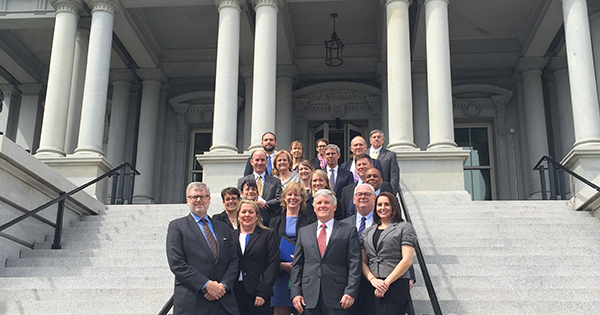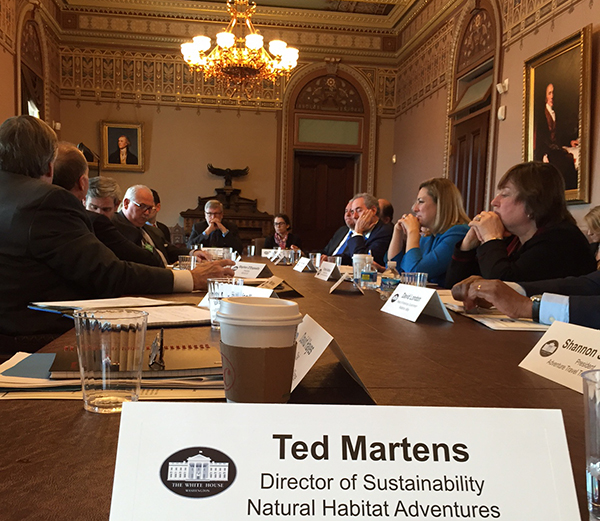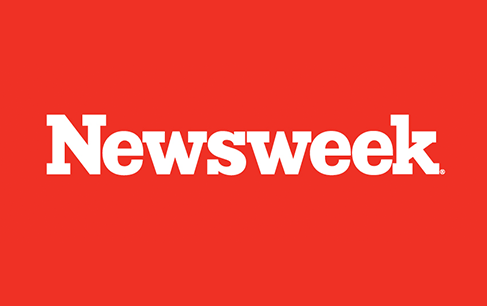Natural Habitat Adventures Attends White House Meeting To Fight Wildlife Trafficking

Hosted by Secretary of the Interior Sally Jewell along with representatives of the White House and State Department, the gathering included nonprofit leaders such as WWF President Carter Roberts, as well as corporate executives from Google, eBay, Etsy, Discovery Communications, Tiffany & Co., Ralph Lauren, Royal Caribbean, Jet Blue, the Adventure Travel Trade Association and others.
Wildlife trafficking is a multi-billion-dollar industry centered on the killing of endangered and threatened species to produce illegal products made from ivory, snake skins, furs and other animal parts. Demand from American businesses and consumers has a tremendous influence on whether lions, elephants, pangolins and other at-risk species will become extinct within our lifetime.
Nat Hab’s Ted Martens, Vice President for Marketing and Sustainability, shared insights and opportunities from the travel industry perspective.
“Frankly, I didn’t realize we still had an illegal wildlife trade problem here in the U.S. — this common misperception was a recurrent theme at the U.S. Wildlife Trafficking Alliance’s White House gathering,” Martens said.
While many people are familiar with the poaching epidemic in Africa, the perception is that the demand for products such as elephant ivory and rhinoceros horn is limited to the Asian market. What most people don’t realize is that the United States is second in demand for illegal wildlife products after China.
A 2013 visit to East Africa brought the issue of wildlife crime to the center of President Obama’s priorities. Through an Executive Order, Obama called on government, nonprofits and the private sector to mobilize behind a joint effort to save at-risk species around the world. The outcome was the creation of the U.S. Wildlife Trafficking Alliance — a broad coalition effort to stop the demand for illegal wildlife products and choke off the supply chains traffickers rely on for access to the U.S. market.
Convened by WWF, National Geographic and other prominent nonprofits that have been active on this issue, the Alliance partners with leading companies in industries where wildlife traffickers try to sell their goods, including jewelry, apparel, e-commerce, and tourism. Natural Habitat Adventures is proud to be a member of the distinctive group of industry leaders committed to reversing this trend.

“The unique challenge within the tourism industry is that travelers are participating in the black market unknowingly — they are fueling demand for illegal products without realizing that is what they are purchasing. Given the opportunity to choose to buy a souvenir made from an endangered species or one made from a sustainable material, I am confident that 100 percent of our travelers would choose the sustainable material,” explains Martens.
To address this issue, Nat Hab has been working in partnership with WWF to develop educational materials for travelers to guide them when purchasing souvenirs during their travels. These resources are being integrated into pre-trip materials and distributed to Nat Hab Expedition Leaders to help guide traveler purchasing behaviors during their travels. Additionally, Nat Hab is working with the Adventure Travel Trade Association to raise awareness of these issues and share best practices with others in the industry.
To learn more about the efforts of the U.S. Wildlife Trafficking Alliance to combat the illegal wildlife trade, visit http://wildlifetraffickingalliance.org/.
This press release was originally published by Widness & Wiggins PR.























